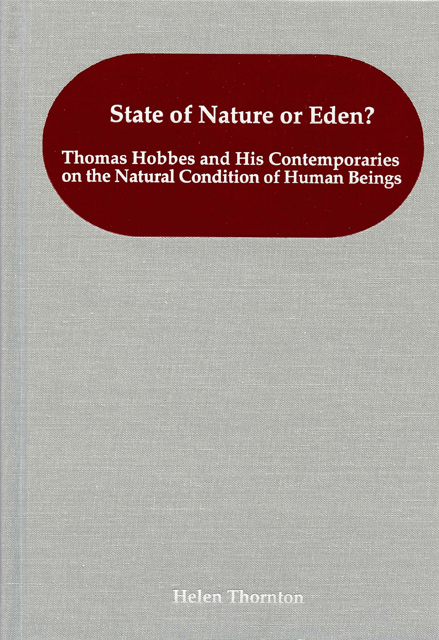 State of Nature or Eden?
State of Nature or Eden? Published online by Cambridge University Press: 21 June 2023
For God doth know that in the day ye eat thereof, then your eyes shall be opened, and ye shall be as gods, knowing good and evil’. (Genesis III.5)
Hobbes’ De Cive and Leviathan were among a number of books condemned and burnt by the University of Oxford in 1683. In the university’s published decree, the eleventh proposition, ‘repugnant to the Holy Scriptures, decrees of councils, writings of the fathers, the faith and profession of the primitive church, and also destructive of the kingly government, the safety of His Majesty’s person, the public peace, the laws of nature and bonds of human society’ was that in ‘the state of nature there is no difference between good and evil, right and wrong …’ The aim of this chapter is to assess the substance of this accusation. Many of Hobbes’ contemporary critics found his state of nature offensive because they understood the natural condition as the original, perfect and peaceful condition of human beings at the creation. Thus, Hobbes’ description of an original war-like condition contradicted the scriptural account. George Lawson, the puritan rector of More in Shropshire, criticized his state of nature for this very reason. For Lawson, the original condition of human beings should have been a condition of peace, not war. But Lawson also thought that if by nature Hobbes actually meant the ‘corruption of Nature, and the same not only original and native, but also acquired by perpetual acts, so far as to quench the light of Nature, and suppress the vigour of those Principles which God left as reliques of his image, then his Position may be true’.
So was it possible for Hobbes’ seventeenth century readers to understand his state of nature as a description of the corruption of human beings, in other words, either as an account of the Fall, or the fallen condition? And if so, did Hobbes’ views on good and evil contradict protestant ideas on the ability of fallen human beings to judge good and evil? Hobbes’ state of nature can be understood in a number of ways. It was an original condition from which individuals created a commonwealth, and for a number of his contemporary critics this meant that it should have been the condition of human beings at the creation.
To save this book to your Kindle, first ensure [email protected] is added to your Approved Personal Document E-mail List under your Personal Document Settings on the Manage Your Content and Devices page of your Amazon account. Then enter the ‘name’ part of your Kindle email address below. Find out more about saving to your Kindle.
Note you can select to save to either the @free.kindle.com or @kindle.com variations. ‘@free.kindle.com’ emails are free but can only be saved to your device when it is connected to wi-fi. ‘@kindle.com’ emails can be delivered even when you are not connected to wi-fi, but note that service fees apply.
Find out more about the Kindle Personal Document Service.
To save content items to your account, please confirm that you agree to abide by our usage policies. If this is the first time you use this feature, you will be asked to authorise Cambridge Core to connect with your account. Find out more about saving content to Dropbox.
To save content items to your account, please confirm that you agree to abide by our usage policies. If this is the first time you use this feature, you will be asked to authorise Cambridge Core to connect with your account. Find out more about saving content to Google Drive.